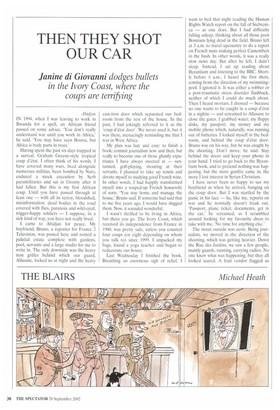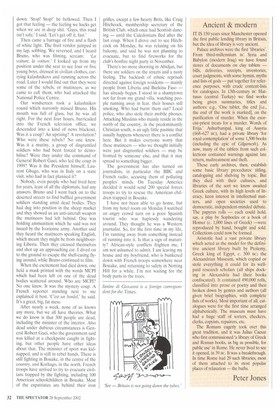THEN THEY SHOT OUR CAR
Janine di Giovanni dodges bullets
in the Ivory Coast, where the coups are teirifying
Abidjan IN 1994, when I was leaving to work in Rwanda for a spell, an African friend passed on sonic advice. 'You don't really understand war until you work in Africa,' he said. 'You may have seen Bosnia, but Africa is body parts in trees.'
Having spent the past six days trapped in a surreal, Graham Greene-style tropical coup d'etat, I often think of his words. I have covered many wars, lived alongside numerous militias, been bombed by Nato, endured a mock execution by Serb paramilitaries and sat in Grozny after it had fallen. But this is my first African coup. Until you have passed through at least one — with all its terror, bloodshed, misinformation, dead bodies in the road covered with flies, paranoia and wild-eyed, trigger-happy soldiers — I suppose, in a sick kind of way, you have not really lived.
I came to Abidjan for peace. My boyfriend. Bruno, a reporter for France 2 Television, was posted here and rented a palatial estate complete with gardens, pool, servants and a large studio for me to write in. The only downside was the heavy iron grilles behind which our guard, Allasane. locked us at night and the heavy cast-iron door which separated our bedroom from the rest of the house. In the past, I had jokingly referred to it as the 'coup d'etat door'. We never used it, but it was there, menacingly reminding me that I was in West Africa.
My plan was lazy and easy: to finish a book; commit journalism now and then, but really to become one of those ghastly expatriates I have always sneered at — suntanned, golf-playing, shouting at their servants. I planned to take up tennis and devote myself to studying good French wine. In other words, I had happily transformed myself into a souped-up French housewife of sorts. 'You stay home and manage the house,' Bruno said. If someone had said that to me five years ago, I would have slugged them. Now, it sounded wonderful.
I wasn't thrilled to be living in Africa, but there you go. The Ivory Coast, which received its independence from France in 4960, was pretty safe, unless you counted four coups (or eight depending on whom you talk to) since 1999. I unpacked my bags, found a yoga teacher and began to redecorate our house.
Last Wednesday I finished the book. Breathing an enormous sigh of relief, I went to bed that night reading the Human Rights Watch report on the fall of Srebrenica — as one does. But I had difficulty falling asleep, thinking about all those poor Bosnians lying dead in the field. Bruno left at 3 a.m. to travel upcountry to do a report on French nuns making perfect Camembert in the bush. In other words, it was a really slow news day. But after he left, I didn't sleep. Instead, I sat up reading about Byzantium and listening to the BBC, Shortly before 4 a.m., I heard the first shots, coming from the direction of my swimmingpool. I ignored it. It was either a robber or a post-traumatic stress disorder flashback, neither of which I could do much about. Then I heard mortars. I dressed — because no one wants to be caught in a coup d'etat in a nightie — and screamed to Allasane to close the gates. I grabbed water, my floppy disks, my passport, my money and my mobile phone which, naturally, was running out of batteries. I locked myself in the bedroom, and behind the coup d'etat door. Bruno was on his way, but he was caught by the shooting. Don't move, he said. Stay behind the doors and keep your phone in your hand. I tried to go back to the Byzantium book, and to pretend nothing was happening, but the more gunfire came in, the more I lost interest in Syrian Christians.
I have never been so happy to see my boyfriend as when he arrived, banging on the coup door. But I was startled by the panic in his face — he, like me, reports on war and he normally doesn't freak out. 'Passport, plane ticket, documents, get in the car,' he screamed. as I scrambled around looking for my favourite dress to take with me. 'No time for anything else.'
The street outside was eerie, Being journalists, we moved in the direction of the shooting, which was getting heavier. Down the Rue des Jardins, we saw a few people, mainly guards, running, carrying radios. No one knew what was happening, but they all looked scared. A fruit vendor flagged us down. 'Stop! Stop!' he bellowed. Then I got that feeling — the feeling we hacks get when we are in deep shit. 'Guys, this road isn't safe.' I said. 'Let's get off it, fast.'
Then came a barrage of fire and a flash of white light. The fruit vendor jumped in my lap, sobbing. We reversed, and I heard Bruno, who was filming, scream: La voiture, la voiture.' I looked up from my position under the seat to see four or five young boys, dressed in civilian clothes, carrying kalashnikovs and running across the road. Later I would find out that they were some of the rebels, or mutineers. as we came to call them, who had attacked the National Police Centre.
Our windscreen took a kalashnikov round which narrowly missed Bruno. His mouth was full of glass, but he was all right. For the next four hours, barricaded into the French television office, we descended into a kind of news blackout. Was it a coup? An uprising? A revolution? Who were these rebels? No one knew. Was it a mutiny, a group of disgruntled soldiers who had been forced to demobilise? Were they under the command of General Robert Guei, who led the coup in 1999? Was it the President himself, Laurent Gbago, who was in Italy on a state visit, who had in fact planned it?
Nobody, even people who had lived here for years, least of all the diplomats, had any answers. Bruno and I went back on to the deserted streets to find baffled government soldiers standing amid dead bodies. They had dug into position in the sheep market and they showed us an anti-aircraft weapon the mutineers had left behind. One was holding ammunition which he said was not issued by the Ivorienne army. Another said they heard the mutineers speaking English, which meant they might be from neighbouring Liberia. Then they excused themselves and shot up an approaching car. I dived on to the ground to escape the shell-casing flying around, while Bruno continued to film.
When the excitement had died down, one held a mask printed with the words MCPI which had been left on one of the dead bodies scattered around. Who are MCPI? No one knew. It was the mystery coup. A French reporter standing next to me explained it best. 'C'est un horde!,' he said. It's a great, big, fat mess.
After nearly a week, none of us knows any more, but we all have theories. What we do know is that 300 people are dead, including the minister of the interior. Also dead under dubious circumstances is General Robert Guei, who the government said was killed at a checkpoint caught in fighting, but other people have other ideas about that. The minister of sport was kidnapped, and is still in rebel hands. There is still fighting in Bouake, in the centre of the country, and Korhago, in the north. French troops have arrived to try to evacuate civilians trapped by the fighting, including 100 American schoolchildren in Bouake. Most of the expatriates are behind their iron grilles, except a few hearty Brits, like Craig Hitchcock, membership secretary of the British Club, which once had Scottish dancing — until the Caledonians fled after the last coup. When I drove out to see Hitchcock on Monday, he was relaxing on his balcony, and said he was not planning to evacuate, but to find fireworks for the club's bonfire night party in November.
There's no more shooting in Abidjan, but there are soldiers on the streets and a nasty feeling. The backlash of ethnic reprisals directed against foreign residents — mainly people from Liberia and Burkina Faso — has already begun. I stood in a shantytown not far from my grand villa, watching people running away in fear, their houses still smoking. Who had burnt them out? Local police, who also stole their mobile phones. Attacking Muslims who mainly reside in the north of the country, in the predominantly Christian south, is an ugly little pastime that usually happens whenever there is a conflict here. But it makes everyone worry that these mutineers — who we thought initially were just disgruntled soldiers — may be fronted by someone else, and that it may spread to something bigger.
The government has also turned on journalists, in particular the BBC and French radio, accusing them of polluting peoples' minds. On Tuesday America decided it would send 200 special forces troops to try to rescue the American children trapped in Bouake.
I have not been able to go home, but from my hotel room on Monday I watched an angry crowd turn on a poor Spanish tourist who was haplessly wandering around. They thought he was a Western journalist. So, for the first time in my life, I'm running away from something instead of running into it. Is that a sign of maturity? African-style conflicts frighten me, I am not ashamed to admit. I am leaving my house and my boyfriend, who is bunkered down with French troops somewhere near Bouake, and returning to safety in Notting Hill for a while. I'm not waiting for the body parts in the trees.
Janine di Giovanni is a foreign correspondent for the Times.



































































































 Previous page
Previous page